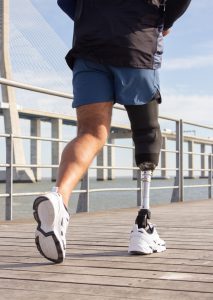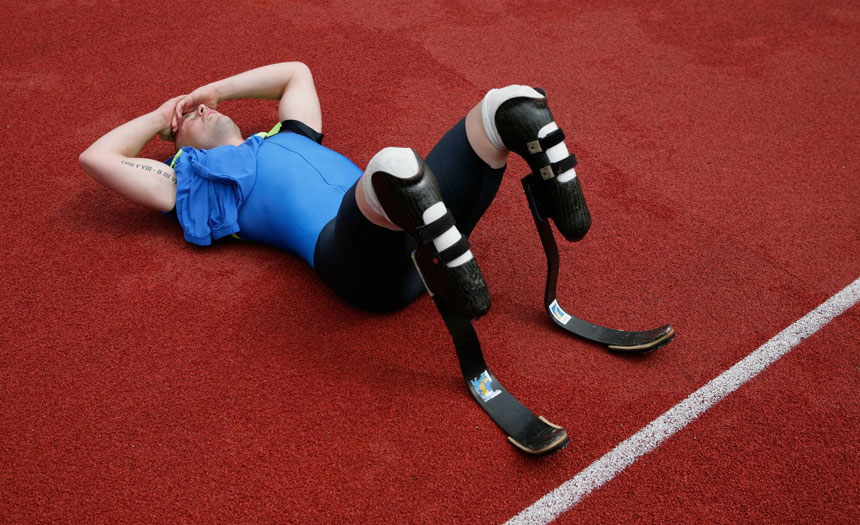By: Dr. Kourosh Resalati
What does bionic mean? Before engaging in the technical definition, we need to describe the word itself. The word bionics was coined by Jack E. Steele in 1958 by combining ‘bion’ which means life in ancient Greek, and the suffix ‘-ic’ meaning characteristic of. Bionic can therefore be defined as life. The other definition offered for the word is ‘bio’ and ‘nic’ from the word electronic. Other words with similar meanings in different disciplines include biomimetic and biomimicry.
The bionic athlete is not far away. In fact body technology is advancing very rapidly, whether through bioengineering, genomics or artificial body parts. The sports scene will be at the forefront. We discuss 10 powerful reasons why the bionic athlete is not far away.
I can still vividly remember the actor Lee Majors in the science fiction series “the six million dollar man” in the seventies. He was a bionic athlete avant la lettre and yes, I am in my fifties! At the time I was totally strucked by the fact that a human could be transformed into kind of a superman with bionic athlete capabilities, whether it being phenomenal eyesight or limbs that could do extraordinary things like lasering and super jumping etc. A long time has gone by ever since, but we are getting closer and closer to such a bionic human and sports will no doubt be at the forefront of such a development.

Genetic enhancements and genomics, artificial bodyparts, performance enhancers, bio-engineering, bio-hacking, chemical drugs, brain computer interfaces! All of these are having the capability to improve human performance and all of these sooner or later will become commonplace. It does not mean that the road towards these ‘new treatments’ will be without bumps and without a lot of public debate. There are for example still loads of ethical question. In any case such treatments will disrupt society and the world of sports in a big way.
Clearly there are loads of positives. Medical patients in the future may benefit from artificial bodyparts or gene adjustments or whatever other treatment. On the back of it such a person will have a healthier life, whilst longer term health related costs can be reduced. Patient happy, society happy! So nothing wrong about this as long as it is safe for the patients and the future of humanity.
The ethical question is the main culprit for some. There is a group that argues that for example gene editing is not that different from a heart or kidney transplantation. They reason that in both cases life is enhanced. Others would argue differently. They say that for example DNA editing has huge long term implications for the human race. Their reasoning is that anything you did not get from god is illegal and dangerous.
But if you can cure a person by such a treatment, why would this be wrong? What is normal and what is not? For example many newly developed drugs and therapies are identical to natural chemicals made by the body. What should be considered as a ‘normal’ level?
Let me start by just asking you a couple of questions in order to clarify the magnitude and difficulty of the problem.
Do you think a professional golf player who has a heart problem and receives a new heart should be allowed to compete on the European Tour? Or would this give him an unfair advantage?
Do you think a player who receives an artificial knee because the old one is injured, should be allowed to compete in spite of the new knee being better than the old one and better than the one of the average player? Does this give him an unfair advantage?
How about the archer that turns blind and receives a new improved bionic eye? Or boxers with bionic arms? What should be allowed and what not?
If you would allow a player to receive an artificial knee, would you allow another player with a healthy knee to receive a new one as well?
Should genetically enhanced babies be allowed to compete in sports, even given the fact they had no say in this? And what about if this was a lifesaving genetic enhancement with as a side effect improved athletic capabilities?
Should the South African athlete Caster Semenya be allowed to compete in spite of having a too high natural testosterone level matching that of a men. Should this be considered unfair? Does it mean some people are unlucky and should not be allowed to participate in competitions? Or should she take medicine to reduce these levels? In such case, what is normal and what is not?
Natural versus artificial or engineered? What and when is something right or not? Some questions for debate I would say, questions with no easy answers. We should be prepared, as no doubt these questions will present itself rather sooner than later.
6 reasons why trend towards the bionic athlete cannot be stopped
History has proven over and over again that the use of new technologies cannot be avoided, particularly if they lead to better performance. Sports is all about peak performance and hence sports will be at the forefront of these new performance enhancing technologies. The future cyber or bionic athlete will no doubt be a fact of life and maybe rather sooner than later. 6 important reasons why I believe this trend cannot be stopped are the following:
- Detecting will be incredibly difficult in some cases
Doping is of all ages. For many years, elite athletes in sports like cycling, track and field and weightlifting have been using performance enhancing drugs. It is naive to believe this will ever stop, particularly as in many cases it is difficult to detect doping. Many newly developed drugs and therapies are identical to natural chemicals made by the body and hence even more difficult to detect.
For bio-engineering and DNA adjustments it is even almost impossible. Think for example of athletes injecting artificial genes into their muscles. No doubt detection will become one of the major issues/ difficulties in sports. As long as such is the case there will be athletes that want to take the risk if chances of being caught are slim.
- Ambition, survival and cheating are of all times
Blind ambition is just part of human nature. So is cheating. There is a thin line between the two. There will always be persons that are prepared to bend the rules, if that can bring fame and fortune. Moreover, if they have the feeling, they are not the only one, crossing the line is not that far away. The same counts for those athletes that have to earn money to have a decent living for themselves and their family.
As long as gene therapy scientists receive multiple calls every day from athletes seeking a genetic advantage and are even prepared to risk their health for this, there is little hope human nature will change.
- The difference between medical treatment and performance enhancement will be blurred
What is medical treatment and what is performance enhancement? If your health is being restored, performance will automatically be enhanced as well. If you get a new hip or gene editing is to improve your general health, it means you will also perform better. In fact, it might well be that your new hip will be much better than you ever dreamed of. So what comes first?
Performance improvement leading to better health or the other way around? It’s a bit similar to the chicken and egg discussion, if you would ask me. In the end it will probably be health restoration that will be the main driver for performance improvement. It will be the ideal excuse.
- The stigma of tinkering with your body being unacceptable will slowly disappear
As medical patients will see results, new sciences such as bio-engineering and genomics will slowly be accepted. In the end, it is the result what counts. In the past there were similar discussions with organ transplantations or breast implants and I could go on for a while. Many people argued this was unacceptable. However, in the end it is proven results what counts! These will lead to a change in view. It is my belief that in say 30 years time, nobody will even blink when you will have some gene adjustments dome in order to have a healthier life. It will be much the same as knee surgery right now.
- The line between natural and artificial body parts blurs
Science is learning how to rebuild the human body in a natural way. It is a bit like cosmetic surgery. On the one hand you can overcome a problem, but you can also craft yourself to the person you would like to be. Is this artificial or is it helping nature? I tend to think the first, but it is debatable.
- Social and cultural factors may be an important catalyst
Parents want to have the best for their kids. They will do everything for them. If for example genetic enhancements can help their kids, some of them will be inclined to go all the way. It really is not something of the future.
We all know there are clinics where by using PGD you can choose the sex of your child. But there is more….if you want your baby to have some specific physical traits, the knowledge to do this already exists. Of course it is not allowed, but I am sure there are ways to go around this.
Don’t be surprised if the first genetically enhanced persons already exist. If you have the money and you want your kid to be an elite (bionic)athlete, you will be able to arrange certain traits. Simultaneously, if you are poor and live in an underdeveloped country, you might be open for genetic tinkering with your (born or unborn) baby in return for money. I know this is all a bit farfetched, but both you and I are probably not prepared to bet on it not happening.




